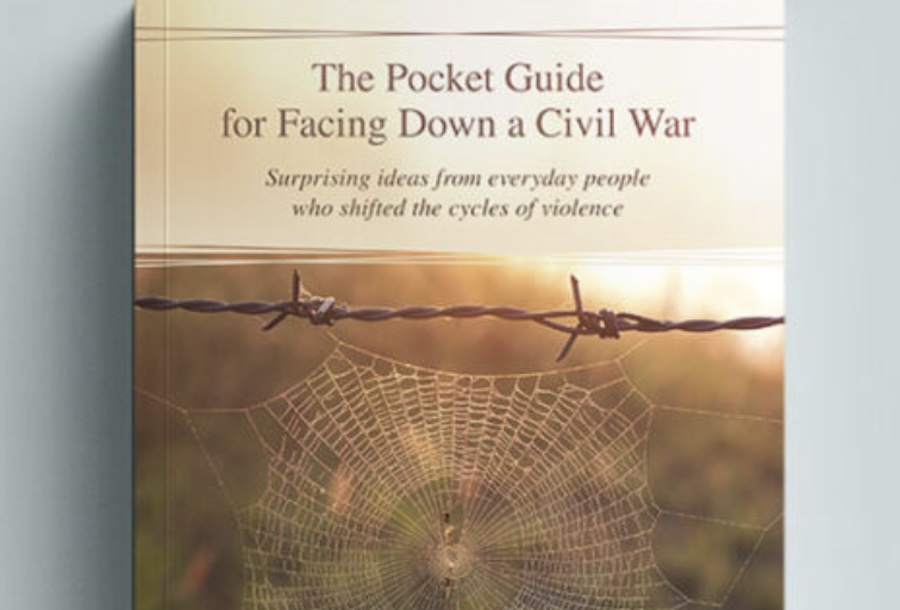DISARMAMENT & SECURITY .
A review of The Pocket Guide for Facing Down a Civil War by John Paul Lederach
In this Pocket Guide, internationally renowned peace practitioner John Paul Lederach reflects on his experience across over four decades mediating and transforming conflicts in places including Northern Ireland, Colombia, Nepal, Somalia, South Sudan, Nicaragua, and Tajikistan, among many others. His experiences grant him a unique perspective not only on what precipitates, propels, and sustains violent conflict, but also into key understandings and approaches that help shift dynamics of harm toward practices of social healing.

The Guide is framed to reflect on questions increasingly posed about the likelihood of divisive polarization in the United States leading toward political violence and even civil war. To consider this question, Lederach offers a comparative view. He suggests that despite the tendency in the U.S. to hold to exceptionalism, the country is not exempt from the toxic dynamics that have been faced in other settings where open armed conflict, once unleashed, became nearly impossible to end. In each chapter, Lederach describes a challenging pattern that repeats across contexts and animates toxic polarization and sustained armed conflict. He illustrates these dynamics with stories, observations, and wisdom gathered from his work with local communities and national leaders in places impacted by such toxicity, describing how they faced down and shifted seemingly ceaseless cycles of violence.
This Pocket Guide does not offer quick fixes. Rather, it explores the way ordinary people resisted and countered patterns of violence in their communities. Their curiosity, persistence, and creative innovation suggest that to face down a civil war and heal long-standing wounds that stoke cycles of violence, people must resist the pull of toxic polarization that legitimates violence as the only option. The challenge is to innovate pockets of vitality that embody the basic idea that politics without violence where we live is possible. Such innovation requires a web of courageous relationships that reach across divides, creating the connective tissue that fosters dignity and respect within, between, and across deep political and cultural difference.
(Continued in right column)
How Can a Civil War Be Avoided in the United States?
(Continued from left column)
In addition to the Pocket Guide, John Paul Lederach has written an op-ed in the Washington Post on this subject.
Based on the analysis above, his op-ed proposes three actions that we should all take:
1. We need to reach beyond our isolated bubbles and open conversations with the perceived enemies in our communities.
2. We have to rehumanize our adversaries; We must have the courage to confront dehumanizing language and behavior, especialy when it comes from within our closest circles.
3. We need to stick with it. We can’t just pull away when difficult issues emerge.
In the article he lists six websites that tell about good initiatives to overcome polarization and develop a peaceful society.
He concludes the op-ed by saying:
The best way to end a civil war is to stop it before it happens.
Will Americans have the courage to nurture these initiatives demonstrating that politics — honest partisan politics — can thrive without violence? I believe we can, and we must.
– – – – – –
(Editor’s note: One is reminded of the teachings of Mahatma Gandhi who said that we never have an enemy, what he have are opponents that we have yet to convince. And we should keep trying to convince them. Gandhi went each week to see the English viceroy who ran the occupation of his country, to tell him of the actions he was going to take for liberation, and to try to convince him that liberation was inevitable and that the British should leave and give India its freedom. In one sense he was successful. The British left without need for a violent revolution. But unfortunately, despite Gandhi’s valiant efforts, India was not able to escape an ensuing civil war between Hindus and Muslims that left a million dead and the division of India into three countries based on religious affiliation.)
– – – – – –
If you wish to make a comment on this article, you may write to coordinator@cpnn-world.org with the title “Comment on (name of article)” and we will put your comment on line. Because of the flood of spam, we have discontinued the direct application of comments.